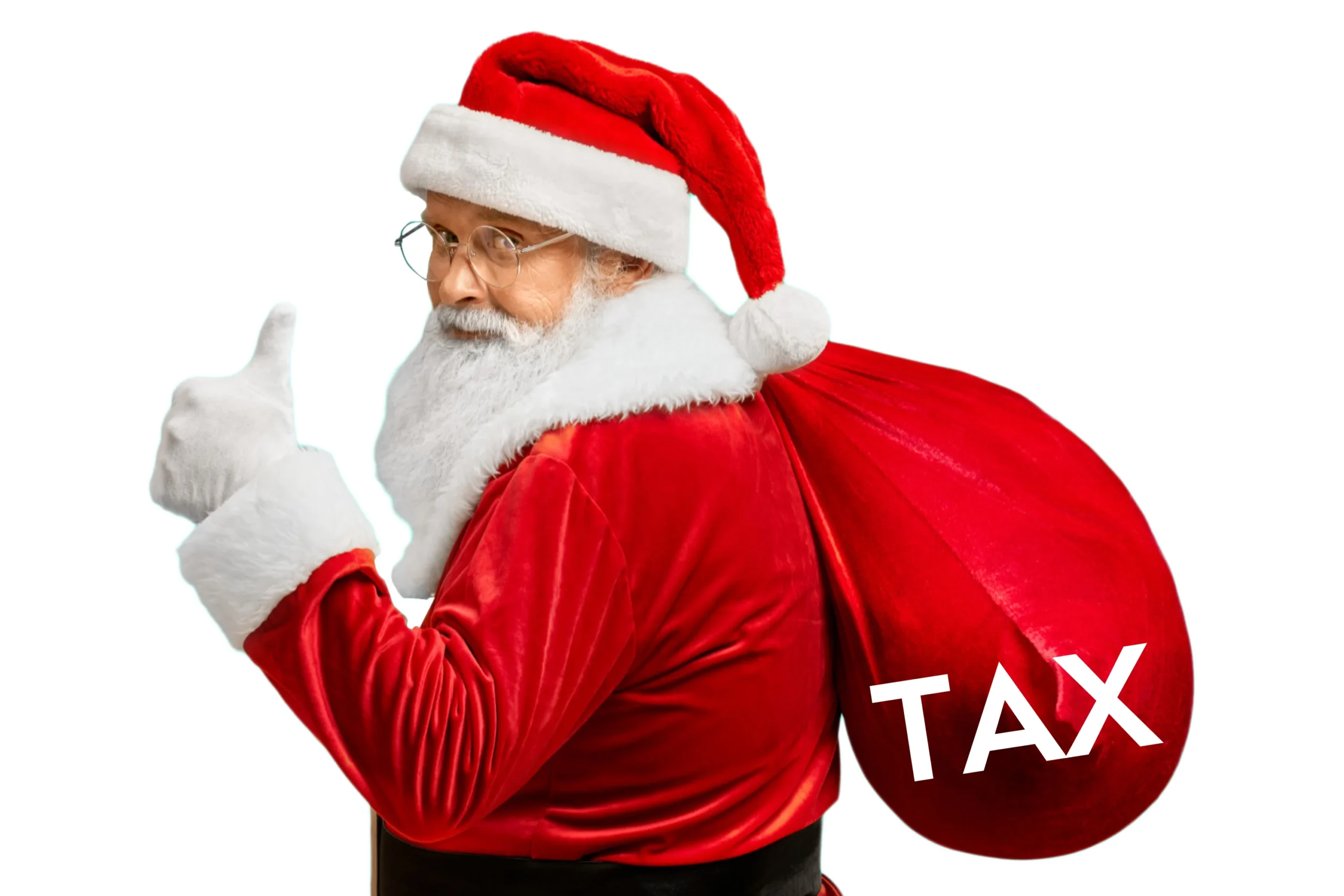It’s that time of year when Santa Claus dusts off his red suit, the elves rev up production in the workshop, and Rudolph starts his pre-flight warm-ups. But have you ever wondered what taxes Santa might pay if he operated in the UK? While the North Pole might be beyond HMRC’s reach, let’s imagine for a moment that Santa’s grotto is subject to UK tax laws. Here’s the rundown on Santa’s potential tax obligations.
1. Corporation Tax – The Santa’s Workshop Ltd.
In our scenario, Santa’s Workshop would likely be registered as a limited company (Santa’s Workshop Ltd., perhaps?), given its large-scale operation. HMRC would consider Santa a business owner, and as such, he’d be liable for Corporation Tax on the workshop’s profits.
Let’s say the elves are efficient, production is through the roof, and profits are jolly. With the current Corporation Tax rate set at 25%, the North Pole would be a little less sparkly as Santa hands over a portion of the workshop’s hard-earned Christmas cash.
Tax Tip for Santa: Capital allowances! Santa can claim for all the machinery and sleigh upgrades—those elves need tools, after all!
2. Employment Taxes – Elves’ PAYE and National Insurance
Santa’s workshop employs a sizeable crew of elves. This means Santa must deal with PAYE and National Insurance contributions for his workforce. Given the volume of toys produced, it’s safe to assume that there are plenty of full-time positions. To comply, Santa would need to set up payroll, deduct income tax, and pay National Insurance for every elf.
Tax Tip for Santa: If the elves get seasonal bonuses, they might push into higher tax brackets. Santa should ensure that bonuses are spread across the year to keep things merry in the payroll department!
3. VAT – Santa’s Magical Toy Distribution
Santa’s toy deliveries are arguably zero-rated as gifts, but if the workshop had any UK customers, sales would likely attract VAT. His distribution network might fall under zero-rated exports, but any workshops in the UK would mean he’d need to register for VAT if his turnover exceeded the threshold of £85,000. The good news? Santa might be able to reclaim VAT on workshop expenses, sleigh maintenance, and elf snacks.
Tax Tip for Santa: Santa should keep records of all purchases and receipts. Who knew filing could be part of the holiday cheer?
4. Business Rates – North Pole Premises
The North Pole might seem remote, but the Santa’s Workshop property would likely face business rates if it were in the UK. As a bustling workshop with heavy machinery, toy inventories, and a (very) active warehouse, business rates could put a dent in the Christmas fund.
Tax Tip for Santa: If the workshop were to locate in certain UK areas, Santa could explore business rates relief options. Small workshops and certain rural businesses qualify for reductions—although the North Pole might be a bit far north for HMRC to consider.
5. Sleigh Road Tax – Navigating the UK’s Roads and Airspace
Assuming Santa’s sleigh occasionally lands in the UK, he might face the Vehicle Excise Duty, or what we commonly call “road tax.” Santa’s sleigh is highly eco-friendly (it’s reindeer-powered), so he may even qualify for green vehicle incentives. In terms of airspace usage, he’d probably need clearance for the night of December 24th, and potential landing fees at high-traffic UK rooftops.
Tax Tip for Santa: Flying under the radar might help here—literally! Avoiding London Heathrow on Christmas Eve will reduce those pesky landing charges!
6. Gift Tax – What About the Presents?
Thankfully, in the UK, there’s no gift tax on Christmas presents. Santa can breathe a sigh of relief knowing that the children of the UK can enjoy their gifts without facing a tax bill. However, for his more generous gifts—those lavish presents to adults—Santa should keep an eye on inheritance and gift tax regulations if he has a UK residency.
7. Personal Tax – Santa’s Income Tax
As the CEO of Santa’s Workshop Ltd., Santa would pay himself a fair salary. As a high-income earner, he’d likely fall into the additional rate tax bracket, paying 45% on earnings over £125,140. And with the current dividend tax rates, Santa would face an additional charge if he took dividends from his thriving workshop’s profits.
Tax Tip for Santa: By carefully balancing salary and dividends, Santa can make the most of his personal allowance and reduce his tax liability—a Christmas gift to himself!
8. Environmental Taxes – Clean Air for the Reindeer!
Given the environmental concerns and the magic dust used to fly the sleigh, Santa might be liable for environmental taxes if his grotto emits any pollutants. Fortunately, Santa’s eco-friendly operation, powered by reindeer and renewable cheer, keeps emissions low. But if the reindeer ate too many brussels sprouts… well, we’ll leave that tax headache for another day.
Final Thought: Is Santa Off the Hook?
While Santa isn’t actually liable to UK tax (phew!), his tax obligations would be no small matter if he were based here. So next time you leave out milk and cookies, remember—Santa works hard year-round, managing his workshop, keeping his elves paid, and juggling an imaginary tax bill that would make any accountant’s head spin!
Happy Holidays from your friends at Black and White Accounting! 🎄



